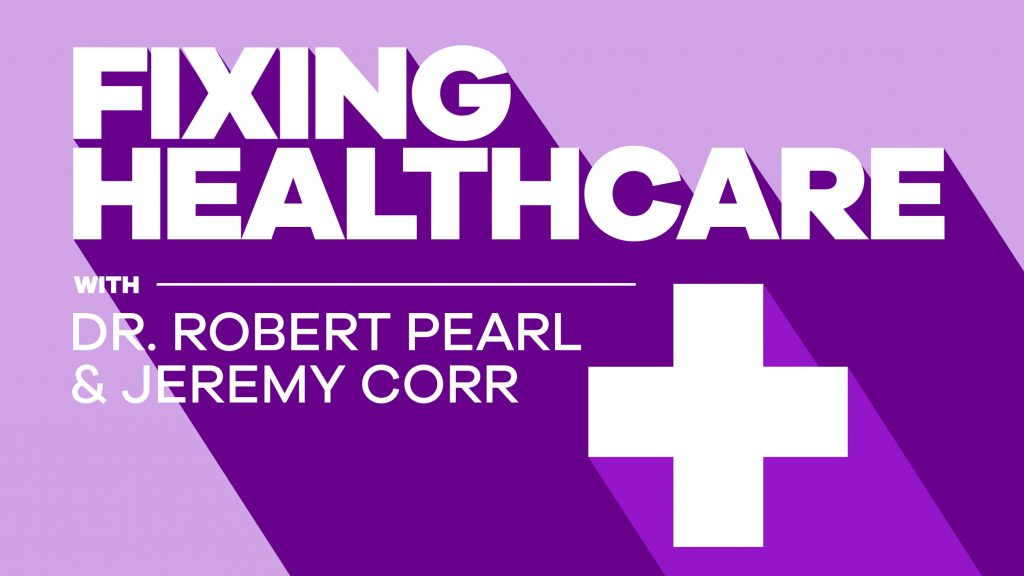Podcast: Play in new window | Download
Subscribe: Spotify | Email | RSS | More
Season One of the Fixing Healthcare podcast concludes this month, along its search for a candidate worthy of becoming the first-ever “Leader of American Healthcare.”
Our sixth and final guest of the season is healthcare futurist and bestselling author Ian Morrison, who brought a welcome combination of humility and humor to the interview.
Said Ian, “My definition of futurist is an economist who couldn’t handle the calculus. I’m in a sweeping generalization business and have been for a very long time.” As a self-described Scottish-Canadian-Californian, Ian also brought a uniquely international perspective to this discussion about fixing American healthcare.
Here now are five of Ian Morrison’s most memorable quotes from Episode 6:
1. On U.S. healthcare versus systems in other countries
“I have come to believe that every healthcare system in the world sucks in its own unique way. They’re all ugly compromises and trade-offs of what I think of as a “value equation” of quality, access, security and benefits, divided by cost. And they all suck. There is no perfect health system.”
2. On the closest thing to perfect for American healthcare
“I would say that our best hope moving forward is to migrate American healthcare to a system I would put under the label of “Medicare Advantage for All.” It tries to reconcile these different values with regard to competition and the role of government, but mandates that everybody is in the system and everyone is covered. What that would necessitate is migrating and building on the growth of integrated delivery systems, providing some kind of global budget framework from the top down, setting perhaps targets at the state level for spending not to exceed GDP per capita targets, much as they’ve done in Massachusetts on a voluntary basis.”
3. On America’s declining life expectancy
“It is remarkable how poorly we are performing. I think it’s partly our priority setting. We don’t do the things that would lift up the bottom of the life expectancy tables, simple things like universal primary care and access to generic drugs that you would think would be a starting point to bring people up from the bottom. We have this unbelievable oipiod epidemic, which many people, economists and physicians alike, believe is driven by diseases of despair, having to do with the lost Nirvana of the American Dream. I think there are economic and social policy solutions there that are going to be much more effective than medical care.”
4. On physician “burnout”
“I’ve done surveys over the years showing that the majority of doctors feel burned out, feel in some senses, alienated and that their work is not valued. So, perhaps ‘burnout’ is not the right term, it might be demoralization. I do think that providing systems with control, where the physicians, as you said in your book, lead the organization. I’m not 100% convinced you have to be a doctor but I think it sure helps if you’re a clinician leading large organizations. I think trying to encourage colleagues to transform in the name of improving care for patients is a professional motivation and these organizations need to be professionally led with that kind of ethos.”
5. On predicting the future of healthcare by understanding the past
“We’re at start of 2019. What’s different since 2009? It’s Obamacare, the iPhone and Trump. The question is what’s going to be different within a 10-year time horizon? The reality we’re going to be dealing with 10 years from now is the absolute peak of the Baby Boom moving through the medical care system. Peak of the baby boom, roughly 1957, so do the math. It’s right in that sweet spot of 2029, 2030, when we’re at the maximum demographic effect. We will have done one of two things. We will either have anticipated that better and have a system where we use high technology to keep people aging in place with tremendous support, where we’ve made investments in social determinants of health, where we have a system of universal coverage all the way through, which is sustainable politically and financially because it’s done on a bipartisan basis. We will have a built the kind of delivery we design into our ongoing health system that incorporates new technology effectively and swiftly at scale. That’s the vision that I hope we have.
READ: Full transcript of our discussion with Ian Morrison
* * *
We hoped you enjoyed the final episode of Season One and will participate in a special project we’re launching to make you, the listener, a part of Season Two. We want to know what changes you would make as “Leader of American Healthcare.”
Click here for a chance to share your solutions with Fixing Healthcare listeners.
A very big thanks to Ian Morrison for helping us wrap up a fantastic first season.
Season Two kicks off in February 2019 with a totally different format. Our first guest will be the cardiac surgeon, entrepreneur and disruptor, Dr. Devi Shetty. He is chairman and founder of Narayana Health, a chain of 21 medical centers in India. He has performed over 15,000 heart operations throughout his career and is committed to making healthcare as affordable as possible. Today, he provides cardiac surgery for less than $1,800 per patient, a fraction of what it costs in United States with results that match the best American hospitals. We cannot wait to have him on the show.
Fixing Healthcare is a co-production of Dr. Robert Pearl and Jeremy Corr. Subscribe to the show via Apple Podcasts or wherever you find podcasts. Join the conversation or suggest a guest by following the show on Twitter and LinkedIn.


